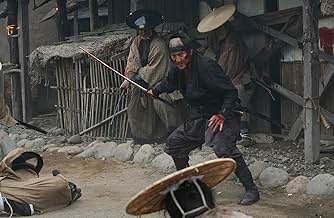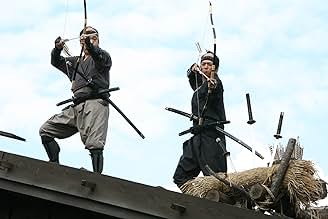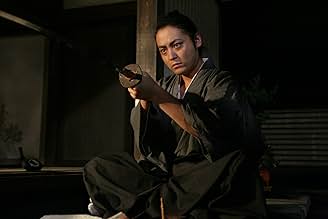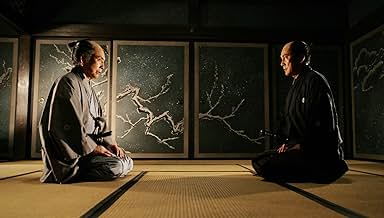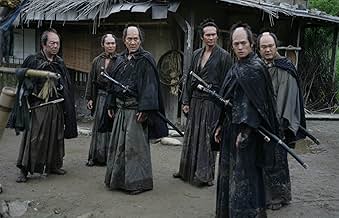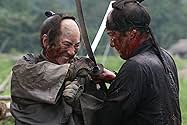Eine Gruppe von Attentätern trifft sich zu einer Selbstmordmission, um einen bösen Lord zu töten.Eine Gruppe von Attentätern trifft sich zu einer Selbstmordmission, um einen bösen Lord zu töten.Eine Gruppe von Attentätern trifft sich zu einer Selbstmordmission, um einen bösen Lord zu töten.
- Regie
- Drehbuch
- Hauptbesetzung
- Auszeichnungen
- 15 Gewinne & 28 Nominierungen insgesamt
Empfohlene Bewertungen
Takashi Miike is arguably one of Japan's hardest working directors who has tackled several different genres, generally with good results. It used to be he would do a dozen or so projects a year, and more in his earlier days. This, of course, has diminished in place of bigger projects, but the man still remains one of Japan's most well known and prolific directors. So, it shouldn't surprise anyone that his undertaking of yet another new genre, the samurai epic, is something of a highly anticipated film. And yes, it succeeds in being another brilliant masterpiece from the man.
13 Assassins, though full of characters, is quite simple actually. A master Shogun samurai is charged with the killing of a cruel and masochistic Shogun lord before he can become more influential in the Japanese Shogunate. With this mission, he gathers together 13 samurai to join him in what appears to be a mostly suicidal mission as they take on a small army of soldiers. For years I have argued that Miike is a master filmmaker that doesn't get nearly the kind of recognition he deserves, as his experience and resume put him up with the likes of other classic filmmakers. This shows in Assassins as he brilliantly puts together this simple, yet purposeful film that calls back to the era of epic samurai films of the likes of Akira Kurosawa. In fact, the influence of Seven Samurai is quite apparent here, even going so far as to model some similar characters. However, do not be mistaken, as this is very much a Miike film, a combination of his abilities to craft a mainstream film and a cult hit.
And the trademarks are certainly there, with the sadistic young Shogun lord bearing the bizarre violent fetishes that have been displayed in Miike's more obscure works, namely Ichi the Killer. As you might suspect, the violence early on is shocking, effective, and often unexpected. This gives way later on to more stylish violence, but none the less, the film is incredibly violent, worthy of a hard R rating by American standards. Miike fans should be very pleased as he both employs his skills as a filmmaker while at the same time adhering to the general guidelines of making a samurai film. Here, he delves greatly into the genre, showing what it means to be a samurai and questioning their purpose through multiple views. Our master samurai, Shinzaemon, sees samurai as being for the people, while Hanbei, his rival, sees them as entirely in servitude to their master without question. Even the young lord, Shinzaemon's target, has a view, thought it is certainly the most negative of any of them.
If I have any complaints, it's two. First, the film does little exposition of the large cast and most of the assassins are simply there to be a fighting force. We learn very little about most of them, and even the samurai we do learn about, including Shinzaemon, get little exposition besides what we already expect, that he's a great samurai of justice. The second would be the clunking over the head about samurai ideals. Miike continues to push messages we've already acquired early in the film and it becomes slightly redundant by the end. However, these are minor complaints that are mostly easily ignored as the film runs at a fast pace with a 45 minute battle that is one of the best samurai battles I've seen on film, comparing to Azumi or Zatoichi's finale, but arguably handled better and with a master's touch.
It's hard to know if this is Miike's pinnacle. He certainly creates a modern samurai masterpiece of an epic here. One particularly powerful scene will remain with you for a long time, and this is the power of Miike's film, one that goes to places many are afraid to tread to leave a lasting impression. Violent, entertaining, and with good examination of the samurai and their duties, fans of Miike's previous films and fans of the samurai epic will not be disappointed.
13 Assassins, though full of characters, is quite simple actually. A master Shogun samurai is charged with the killing of a cruel and masochistic Shogun lord before he can become more influential in the Japanese Shogunate. With this mission, he gathers together 13 samurai to join him in what appears to be a mostly suicidal mission as they take on a small army of soldiers. For years I have argued that Miike is a master filmmaker that doesn't get nearly the kind of recognition he deserves, as his experience and resume put him up with the likes of other classic filmmakers. This shows in Assassins as he brilliantly puts together this simple, yet purposeful film that calls back to the era of epic samurai films of the likes of Akira Kurosawa. In fact, the influence of Seven Samurai is quite apparent here, even going so far as to model some similar characters. However, do not be mistaken, as this is very much a Miike film, a combination of his abilities to craft a mainstream film and a cult hit.
And the trademarks are certainly there, with the sadistic young Shogun lord bearing the bizarre violent fetishes that have been displayed in Miike's more obscure works, namely Ichi the Killer. As you might suspect, the violence early on is shocking, effective, and often unexpected. This gives way later on to more stylish violence, but none the less, the film is incredibly violent, worthy of a hard R rating by American standards. Miike fans should be very pleased as he both employs his skills as a filmmaker while at the same time adhering to the general guidelines of making a samurai film. Here, he delves greatly into the genre, showing what it means to be a samurai and questioning their purpose through multiple views. Our master samurai, Shinzaemon, sees samurai as being for the people, while Hanbei, his rival, sees them as entirely in servitude to their master without question. Even the young lord, Shinzaemon's target, has a view, thought it is certainly the most negative of any of them.
If I have any complaints, it's two. First, the film does little exposition of the large cast and most of the assassins are simply there to be a fighting force. We learn very little about most of them, and even the samurai we do learn about, including Shinzaemon, get little exposition besides what we already expect, that he's a great samurai of justice. The second would be the clunking over the head about samurai ideals. Miike continues to push messages we've already acquired early in the film and it becomes slightly redundant by the end. However, these are minor complaints that are mostly easily ignored as the film runs at a fast pace with a 45 minute battle that is one of the best samurai battles I've seen on film, comparing to Azumi or Zatoichi's finale, but arguably handled better and with a master's touch.
It's hard to know if this is Miike's pinnacle. He certainly creates a modern samurai masterpiece of an epic here. One particularly powerful scene will remain with you for a long time, and this is the power of Miike's film, one that goes to places many are afraid to tread to leave a lasting impression. Violent, entertaining, and with good examination of the samurai and their duties, fans of Miike's previous films and fans of the samurai epic will not be disappointed.
This film was a dark-edged delight from beginning to end when I saw it at the 2010 edition of TIFF. The audience there loved it too, breaking out into spontaneous applause during several scenes.
Solid direction by Miike, great characters, beautifully shot and simply some of the best and most intense action sequences put on film - ever! It does have it's obvious influences, such as Kurosawa's "Seven Samurai", but damn, this one kicks ass mightily! You've never seen Shogun like this! And something else to point out: the sound on this film was thundering, shaking and stellar! THIS is the kind of film that reminds us why we go to a movie theatre to enjoy a film on a big screen, why we turn off our cell phones and immerse ourselves in the experience of cinema-going, as opposed to staying home on our couches.
I'll go see it again on the big screen when it hopefully returns to town - you can bet on that!
Solid direction by Miike, great characters, beautifully shot and simply some of the best and most intense action sequences put on film - ever! It does have it's obvious influences, such as Kurosawa's "Seven Samurai", but damn, this one kicks ass mightily! You've never seen Shogun like this! And something else to point out: the sound on this film was thundering, shaking and stellar! THIS is the kind of film that reminds us why we go to a movie theatre to enjoy a film on a big screen, why we turn off our cell phones and immerse ourselves in the experience of cinema-going, as opposed to staying home on our couches.
I'll go see it again on the big screen when it hopefully returns to town - you can bet on that!
I'm a little wary of films from Takashi Miike as, although they are generally received as good, my experience of them has been that they are bloody and very odd. Thirteen Assassins though seemed a bit more accessible in terms of being more straightforward, which in some ways then makes the violence a little easier to watch. The plot here sees the amoral behaviour of Lord Naritsugu infuriate a small group of men who, led by veteran samurai Shinzaemon, set out to trap him and his 100+ entourage of guards (led by samurai Hanbei) in order to kill him and end his rise to power for the greater good.
This plot essentially cuts the film in half. The first half of the film is the setup and is mostly dialogue driven. It is slow and patient but not dull as the main thing it does is to turn the main character (and the audience) against Naritsugu by virtue of the terrible things he has done. This is brutal and quite shocking in regards some of the things we see, half-see or view the aftermath of. At the same time it gives us some time to get to know the thirteen main characters; although there is an air of honour to all of them, the characters do have traits of humour, weakness, anger and so on, which mark them out but also add some colour to the telling. The second half of the film begins when the trap is sprung and a small village becomes a contained killing field soon to be filled with bodies and blood.
I had wondered how I would find this because there was always the potential that action involving this size of a crowd would just be a mess of flailing and blood and that it wouldn't have any tension or flow to it. To a certain extent, this is a bit of a problem at times but mostly Miike overcomes it by splitting up the characters across the village and mixing smaller conflicts with bigger ones. You do still need to buy the sight of tired individual men cutting through a stream of 20 men but the narrative sort of makes this easy (it is a time of peace with a lower standard of samurai) but also it isn't all this type of action. It is bloody but without being overly gory for the sake of it. The delivery manages to make me believe the concept of the honourable death (not something I do normally) because of how dishonourable Naritsugu is and how likable Shinzaemon is throughout. The cast do well in this regard not only to make characters but also to remain distinguishable in the midst of the chaos and blood. Yakusho is strong in the lead and he contrasts well with Ichimura and Inagaki well; both of whom are also good even if Inagaki has a bit of an open goal in regards doing a simple amoral character. The supporting cast are good and mix their characters well with my favourite being Iseya who is fun and funny even if what his character represents sort of doesn't work for my western viewpoint.
Overall though, Thirteen Assassins is an engaging film that has good build-up which explodes into chaos and violence for the second half. I don't think it is perfect but in fairness some of the problems I had with it came with the plot and the territory, so they are not failings so much as just part of the film.
This plot essentially cuts the film in half. The first half of the film is the setup and is mostly dialogue driven. It is slow and patient but not dull as the main thing it does is to turn the main character (and the audience) against Naritsugu by virtue of the terrible things he has done. This is brutal and quite shocking in regards some of the things we see, half-see or view the aftermath of. At the same time it gives us some time to get to know the thirteen main characters; although there is an air of honour to all of them, the characters do have traits of humour, weakness, anger and so on, which mark them out but also add some colour to the telling. The second half of the film begins when the trap is sprung and a small village becomes a contained killing field soon to be filled with bodies and blood.
I had wondered how I would find this because there was always the potential that action involving this size of a crowd would just be a mess of flailing and blood and that it wouldn't have any tension or flow to it. To a certain extent, this is a bit of a problem at times but mostly Miike overcomes it by splitting up the characters across the village and mixing smaller conflicts with bigger ones. You do still need to buy the sight of tired individual men cutting through a stream of 20 men but the narrative sort of makes this easy (it is a time of peace with a lower standard of samurai) but also it isn't all this type of action. It is bloody but without being overly gory for the sake of it. The delivery manages to make me believe the concept of the honourable death (not something I do normally) because of how dishonourable Naritsugu is and how likable Shinzaemon is throughout. The cast do well in this regard not only to make characters but also to remain distinguishable in the midst of the chaos and blood. Yakusho is strong in the lead and he contrasts well with Ichimura and Inagaki well; both of whom are also good even if Inagaki has a bit of an open goal in regards doing a simple amoral character. The supporting cast are good and mix their characters well with my favourite being Iseya who is fun and funny even if what his character represents sort of doesn't work for my western viewpoint.
Overall though, Thirteen Assassins is an engaging film that has good build-up which explodes into chaos and violence for the second half. I don't think it is perfect but in fairness some of the problems I had with it came with the plot and the territory, so they are not failings so much as just part of the film.
"Thirteen. The time has come to lay down your lives for the greater cause. Are you ready?"
13 Assassins is all about the payoff. And the payoff comes in the form of 50 minutes of absolute carnage at the end of the movie. The story is about 13 warriors, some of the last truly capable samurai at a time when the era of those legendary soldiers was coming to an end, who band together to kill a despicable, deranged and utterly evil lord who is step-brother and future heir to the ruling shogun. Greatly outnumbered, the men devise a plan to force Lord Naritsugu and his guards to a village that they've prepared as what can only be called as a deathtrap.
If you liked the "Crazy 88's" fight from Kill Bill Volume 1 or the massive battle at the end of Azumi, then the epic showdown at the end of 13 Assassins automatically makes this a must see. But what about the preceding half of the movie? Most of that time is spent introducing us to the 13 assassins, Sir Hanbei - the noble but loyal to a fault man who is in charge of Lord Naritsugu's safety, and making us hate (and I mean REALLY hate) the lord himself. This portion of the movie was necessary to setup finale, but it was understandably not as exciting or captivating as the lengthy battle it precedes.
Rest assured though, the storytelling doesn't stop when the action begins. Some action scenes in movies can be so endless that they become monotonous (and boring, as a result), but 13 Assassins neatly avoids that trap by including character development until the very end.
This is a brutal, visceral movie, from the sadism of Lord Naritsugu to the blood-soaked, frenetic finale. If that sounds like something you'd be interested in, I heartily recommend that you give it a shot.
13 Assassins is all about the payoff. And the payoff comes in the form of 50 minutes of absolute carnage at the end of the movie. The story is about 13 warriors, some of the last truly capable samurai at a time when the era of those legendary soldiers was coming to an end, who band together to kill a despicable, deranged and utterly evil lord who is step-brother and future heir to the ruling shogun. Greatly outnumbered, the men devise a plan to force Lord Naritsugu and his guards to a village that they've prepared as what can only be called as a deathtrap.
If you liked the "Crazy 88's" fight from Kill Bill Volume 1 or the massive battle at the end of Azumi, then the epic showdown at the end of 13 Assassins automatically makes this a must see. But what about the preceding half of the movie? Most of that time is spent introducing us to the 13 assassins, Sir Hanbei - the noble but loyal to a fault man who is in charge of Lord Naritsugu's safety, and making us hate (and I mean REALLY hate) the lord himself. This portion of the movie was necessary to setup finale, but it was understandably not as exciting or captivating as the lengthy battle it precedes.
Rest assured though, the storytelling doesn't stop when the action begins. Some action scenes in movies can be so endless that they become monotonous (and boring, as a result), but 13 Assassins neatly avoids that trap by including character development until the very end.
This is a brutal, visceral movie, from the sadism of Lord Naritsugu to the blood-soaked, frenetic finale. If that sounds like something you'd be interested in, I heartily recommend that you give it a shot.
In 1844, the peace of the Feudal Japan is threatened by the cruel Lord Naritsugu Matsudaira (Gorô Inagaki) that is politically rising and getting closer to his half-brother, the shogun. After the harakiri of Namiya clan leader, the samurai Shinzaemon Shimada (Kôji Yakusho) is summoned by the shogun's adviser Sir Doi (Mikijiro Hira) of the Akash Clan to listen to the tragedy of Makino Uneme ((Takumi Saitô), whose son and daughter-in-law have been murdered by Naritsugu. Then Sir Doi shows a woman with arms, legs and tongue severed by Naritsugu and she writes with her forearm a request to Shinza to slaughter Naritsugu and his samurais.
Shinza promises to kill Naritsugu and he gathers eleven other samurais and plots a plan to attack Naritsugu in his trip back to the Akash land. But the cunning samurai Hanbei Kitou (Masachika Ichimura) that is responsible for the security of his master foresees Shinza's intent. Shinza decides to go with his samurais through the mountain, where they find the hunter Koyata (Yûsuke Iseya) that guides them off the mountain and joins the group. Now the thirteen men prepare an ambush to Naritsugu and his army of two hundred samurais in a suicide mission to stop evil.
"Jûsan-nin no shikaku", a.k.a, "13 Assassins", is a future classic of the samurai genre by Takashi Miike. It is inevitable to compare this film with Akira Kurosawa's "Seven Samurais" and the epic "The 300 Spartans", but "13 Assassins" is among the best samurais movies I have ever seen, with a solid story in the Edo period of Japan, stunning cinematography, wonderful performances and fantastic choreography in the battle scenes. My vote is nine.
Title (Brazil): "13 Assassinos" ("13 Assassins")
Shinza promises to kill Naritsugu and he gathers eleven other samurais and plots a plan to attack Naritsugu in his trip back to the Akash land. But the cunning samurai Hanbei Kitou (Masachika Ichimura) that is responsible for the security of his master foresees Shinza's intent. Shinza decides to go with his samurais through the mountain, where they find the hunter Koyata (Yûsuke Iseya) that guides them off the mountain and joins the group. Now the thirteen men prepare an ambush to Naritsugu and his army of two hundred samurais in a suicide mission to stop evil.
"Jûsan-nin no shikaku", a.k.a, "13 Assassins", is a future classic of the samurai genre by Takashi Miike. It is inevitable to compare this film with Akira Kurosawa's "Seven Samurais" and the epic "The 300 Spartans", but "13 Assassins" is among the best samurais movies I have ever seen, with a solid story in the Edo period of Japan, stunning cinematography, wonderful performances and fantastic choreography in the battle scenes. My vote is nine.
Title (Brazil): "13 Assassinos" ("13 Assassins")
Wusstest du schon
- WissenswertesThe opening sequence of this film is a shot by shot recreation of the 1960s era original.
- Zitate
Kujuro Hirayama: No mercy! There's no samurai code or fair play in battle! No sword? Use a stick. No stick? Use a rock. No rock? Use your fists and feet! Lose your life, but make the enemy pay!
- Crazy CreditsAlthough most of the opening credits after the distributor's name are in Japanese, there are three in English: Recorded Picture Company, Yahoo! Japan, and Tsutaya.
- Alternative VersionenThe runtime of the Japanese release is 141 minutes, for but the international distribution a reduced cut of 126 minutes was released, which among other things omits some scenes referring to Japanese mythology (such as several scenes which indicate that the hunter Koyata is not of human flesh, but a demon).
- VerbindungenFeatured in At the Movies: Venice Film Festival 2010 (2010)
Top-Auswahl
Melde dich zum Bewerten an und greife auf die Watchlist für personalisierte Empfehlungen zu.
- How long is 13 Assassins?Powered by Alexa
- Why is the Bandit still alive after being stabbed by Lord Naritsugu's sword?
- What does the woman who had her limbs cut off write on the scroll?
- What are the differences between the international cut and the Japanese cut?
Details
- Erscheinungsdatum
- Herkunftsländer
- Offizielle Standorte
- Sprache
- Auch bekannt als
- 13 asesinos
- Drehorte
- Produktionsfirmen
- Weitere beteiligte Unternehmen bei IMDbPro anzeigen
Box Office
- Budget
- 6.000.000 $ (geschätzt)
- Bruttoertrag in den USA und Kanada
- 802.778 $
- Eröffnungswochenende in den USA und in Kanada
- 45.854 $
- 1. Mai 2011
- Weltweiter Bruttoertrag
- 18.689.058 $
- Laufzeit2 Stunden 21 Minuten
- Farbe
- Sound-Mix
- Seitenverhältnis
- 2.35 : 1
Zu dieser Seite beitragen
Bearbeitung vorschlagen oder fehlenden Inhalt hinzufügen





